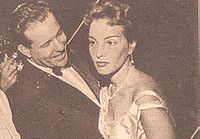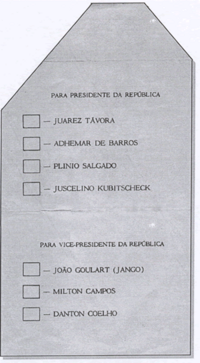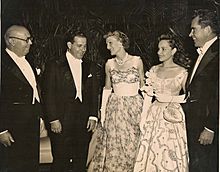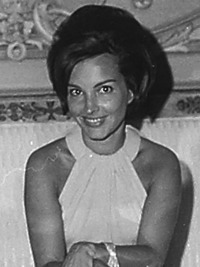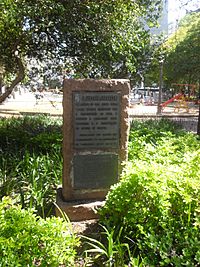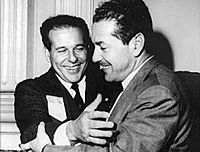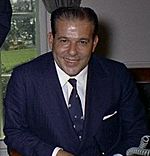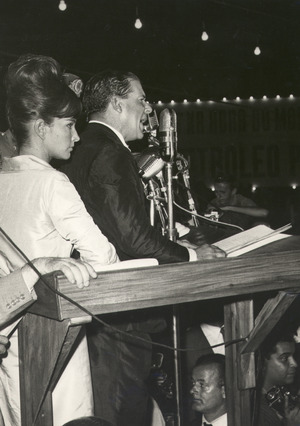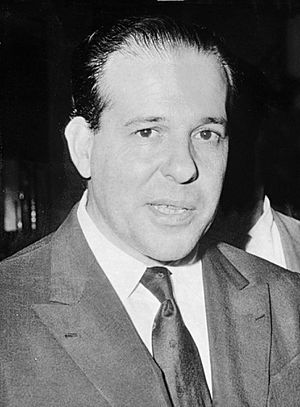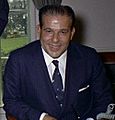João Goulart facts for kids
Quick facts for kids
João Goulart
|
|
|---|---|
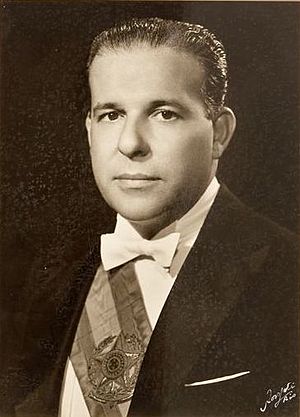
Goulart in 1961
|
|
| President of Brazil | |
| In office 8 September 1961 – 1 April 1964 |
|
| Prime Minister | Tancredo Neves Brochado da Rocha Hermes Lima |
| Vice President | None |
| Preceded by | Ranieri Mazzilli (interim) |
| Succeeded by | Ranieri Mazzilli (interim) |
| Vice President of Brazil | |
| In office 31 January 1956 – 25 August 1961 |
|
| President | Juscelino Kubitschek Jânio Quadros |
| Preceded by | Café Filho |
| Succeeded by | José Maria Alkmin |
| Member of the Chamber of Deputies | |
| In office 23 February 1954 – 3 February 1955 |
|
| Constituency | Rio Grande do Sul |
| In office 23 March 1952 – 18 June 1953 |
|
| Constituency | Rio Grande do Sul |
| In office 11 March 1951 – 25 March 1951 |
|
| Constituency | Rio Grande do Sul |
| Minister of Labour, Industry and Trade | |
| In office 18 June 1953 – 23 February 1954 |
|
| President | Getúlio Vargas |
| Preceded by | José de Segadas Viana |
| Succeeded by | Hugo de Araújo Faria |
| President of the Brazilian Labour Party | |
| In office 20 May 1952 – 19 May 1965 |
|
| Preceded by | Dinarte Dornelles |
| Succeeded by | Lutero Vargas |
| Secretary of the Interior and Justice of Rio Grande do Sul | |
| In office 31 January 1951 – 23 March 1952 |
|
| Governor | Ernesto Dornelles |
| Preceded by | Oscar Carneiro da Fontoura |
| Succeeded by | Egídio Michaelsen |
| Member of the Legislative Assembly of Rio Grande do Sul | |
| In office 10 March 1947 – 31 January 1951 |
|
| Constituency | At-large |
| Personal details | |
| Born |
João Belchior Marques Goulart
1 March 1919 São Borja, Rio Grande do Sul, Brazil |
| Died | 6 December 1976 (aged 57) Mercedes, Corrientes, Argentina |
| Cause of death |
|
| Resting place | Cemitério Jardim da Paz São Borja, Rio Grande do Sul, Brazil |
| Political party | PTB (1946–1965) |
| Spouse |
Maria Teresa Fontela
(m. 1955) |
| Children | João Vicente Goulart (b. 1956) Denise Goulart (b. 1957) |
| Signature |  |
João Belchior Marques Goulart (born March 1, 1919 – died December 6, 1976), often called Jango, was an important Brazilian politician. He served as the 24th President of Brazil until the military removed him from power on April 1, 1964. Many people saw him as the last president with ideas focused on helping workers and the poor (often called left-wing) until Luiz Inácio Lula da Silva became president in 2003.
Contents
- Who Was João Goulart?
- Early Life and Education
- Starting a Political Career
- Minister of Labor
- Becoming Vice President
- As Vice President
- Becoming President
- Goulart's Presidency
- The Military Coup
- Life in Exile
- Death and Investigations
- Political Beliefs
- Tributes and Recognition
- Electoral Performance
- Images for kids
- See also
Who Was João Goulart?
João Goulart was known by his nickname Jango. This was a common way to shorten the name João in southern Brazil. When he ran for president with Jânio Quadros, their campaign was even called Jan–Jan, combining their nicknames.
As a child, he was called Janguinho, meaning "little Jango". Later, when he entered politics, he was supported by Getúlio Vargas. His friends and colleagues then started calling him Jango.
His family came from Portuguese immigrants from the Azores islands. They arrived in Rio Grande do Sul in the 1700s.
Early Life and Education
João Goulart was born on a farm in São Borja, Rio Grande do Sul, on March 1, 1919. His parents were Vicentina Marques Goulart and Vicente Rodrigues Goulart. His father was a rancher who owned large properties.
João grew up with six sisters. His two younger brothers died when they were young. João was a skinny boy.
He went to school in Itaqui and later in Uruguaiana. He also attended Colégio Anchieta in Porto Alegre. João was good at football, playing as a right-back. He even became a state champion in 1932 with Sport Club Internacional's youth team.
His father wanted him to study law. João went to law school at the Universidade Federal do Rio Grande do Sul. He graduated in 1939 but never fully worked as a lawyer.
Between 1941 and 1945, João Goulart became a wealthy businessman. He made loans using his cattle as collateral. He was known for being kind to his employees and helping those in need.
Starting a Political Career
João Goulart's father passed away in 1943. João inherited farms, which made him a very influential rancher in his area.
After President Getúlio Vargas resigned and returned to São Borja in 1945, Goulart met with him often. These meetings helped Goulart decide to enter politics.
He joined the Brazilian Labour Party (PTB). He became the first president of the local PTB. Later, he led the party at the state and national levels.
In 1947, Getúlio Vargas convinced Goulart to run for a seat in the state assembly. He won and became a state deputy. He received more votes than his future brother-in-law, Leonel Brizola. Goulart became a close friend and political student of Vargas.
In 1950, Goulart was elected to the Chamber of Deputies. He became a federal deputy in February 1951. He also served as the secretary of the interior and justice for Governor Ernesto Dornelles. During this time, he worked to improve conditions in prisons.
Minister of Labor
In 1953, President Vargas appointed Goulart as the Minister of Labor. At this time, Vargas's government was facing many problems. Workers were striking because of low wages. Right-wing groups and the military were trying to remove Vargas from power.
As Minister of Labor, Goulart worked to help workers. He held the first Brazilian Congress of Social Security. He signed new rules to support social security, like housing loans.
Goulart was known for listening to workers and union leaders. He preferred to negotiate with striking workers and their bosses instead of using force. He said he supported capitalists who invested in Brazil and created wealth fairly. However, he was against those who only sought quick, unfair profits.
In late 1953, Goulart began to study how to increase the minimum wage. Workers wanted a 100% increase. Businesses only wanted a 42% raise. On May Day, Vargas signed a law that doubled the minimum wage, as workers had demanded.
This decision caused a strong reaction from the media and the military. Goulart resigned on February 22, 1954, and returned to his role as a federal deputy.
The political crisis worsened after an assassination attempt against a political leader on August 5, 1954. Vargas was pressured to resign. On August 24, 1954, Vargas called Goulart and gave him a document, his death note Carta Testamento. Vargas died shortly after.
Becoming Vice President
After Vargas's death, Goulart was very sad and thought about leaving politics. But he decided to continue after receiving encouragement from other politicians.
The PTB, led by Goulart, grew and focused on social reforms. Goulart became the president of the PTB. He made the party more organized and focused on workers' rights.
1955 Elections and Wedding
In 1955, Juscelino Kubitschek (JK) ran for president, and Goulart ran for vice president. This caused some concern among conservative groups and the military.
Goulart had to get married before taking office. He married Maria Thereza, who was 17, on April 26, 1955. The civil ceremony was done by proxy because Goulart's plane couldn't land due to a storm.
Despite opposition, Juscelino Kubitschek was elected president, and Goulart was elected vice president. Some groups tried to stop them from taking office.
Protecting Democracy
In November 1955, President Café Filho became ill. Carlos Luz, who was close to groups wanting a military takeover, took his place.
General Henrique Teixeira Lott, who supported the law, led a counter-coup to protect democracy. Carlos Luz was removed from power, and Nereu Ramos became interim president. This prevented a military takeover and allowed Kubitschek and Goulart to take office on January 31, 1956.
As Vice President
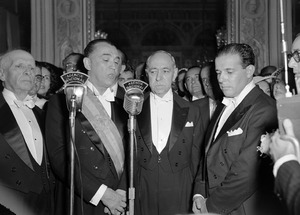
As Vice President, Goulart was important for keeping the JK government stable. He was good at negotiating with trade unions. He helped resolve conflicts between workers and businesses. He often met with union leaders at his home.
Goulart also served as the President of the Federal Senate of Brazil. During this time, the PTB held important government positions, including the Ministry of Labor.
In April 1956, Goulart visited the United States. He discussed the issue of communism. He believed it was Brazil's internal concern, while the U.S. saw it as a broader problem. He also visited Canada, Europe, Mexico, and Uruguay.
Goulart believed Brazil should be less dependent on the U.S. for trade. He supported nationalist ideas within the PTB.
During his time as Vice President, his children, João Vicente and Denise, were born. He was a loving father.
By the end of JK's government, Brazil's economy was unstable. Goulart began to think that the 1946 Constitution needed changes to better reflect society's needs.
The "Jan-Jan" Ticket
In 1960, discussions began for the next presidential elections. The PTB nominated Marshal Lott for president, with Goulart as Vice President.
However, an informal campaign called "Jan-Jan" became popular. This meant Jânio Quadros for president and Jango (Goulart) for vice president. This ticket won the election.
Becoming President
When Jânio Quadros became president, Brazil was facing financial problems. Quadros tried to show he was different from Goulart. He formed a conservative government and pursued an independent foreign policy, which pleased some left-wing groups.
Goulart and his family moved to Granja do Torto in the new capital, Brasília. In December 1960, he visited Czechoslovakia.
Visit to China and Resignation
In July 1961, Goulart led a trade mission to China. On his way, he visited the USSR and met with Nikita Khrushchev. In Beijing, he spoke about friendship between Brazil and China. This was seen by some Western countries as support for communism.
On August 24, Goulart sent a letter to President Quadros, reporting the success of his mission. The next day, Quadros resigned.
Quadros hoped that Goulart, who was seen as too left-leaning, would not be allowed to become president. He thought this would force him back into power. However, the National Congress accepted his resignation.
Military ministers formed a temporary government. They said Goulart would be arrested if he returned to Brazil. They wanted Congress to remove Goulart from his position, but Congress did not.
Goulart learned about the resignation while in China. He considered resigning himself but decided against it when he heard about the military's attempt to stop him.
The Legality Campaign
On August 25, 1961, after Quadros resigned, Goulart's brother-in-law, Leonel Brizola, began the "Legality Campaign." This campaign aimed to ensure Goulart could become president, as was legal. Marshal Lott, who supported the law, was arrested.
With public support, Brizola started broadcasting messages across Brazil. This "Legality Chain" gained international attention.
In Rio Grande do Sul, General José Machado Lopes supported the Legality Campaign, which helped prevent a civil war.
In Paris, Goulart learned more details. He decided to delay his return to avoid a civil war. He agreed to a plan where Brazil would switch to a parliamentary system of government. This meant the prime minister would have more power than the president.
On September 1, Goulart returned to Brazil. The National Congress approved the parliamentary system. Goulart arrived in Brasília on September 5 and officially became president on September 7, 1961.
Goulart's Presidency
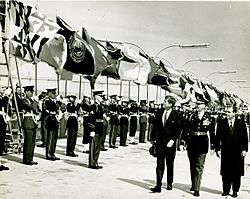
In his inauguration speech, Goulart called for "unity, democracy, and reform." He faced challenges like military tensions and national debts. He hoped to achieve his reform goals through agreements.
His first cabinet, led by Tancredo Neves as prime minister, was formed on September 8. Later, Francisco de Paula Brochado da Rocha and then Hermes Lima served as prime ministers.
During this time, Goulart's government created Eletrobrás in 1962. This became Latin America's largest power company. It aimed to strengthen Brazil's energy sector.
As part of the agreement to install the parliamentary system, a public vote (plebiscite) was planned for 1963. The people would decide if they wanted to keep the parliamentary system or return to a presidential one. In the 1963 vote, Brazilians overwhelmingly rejected the parliamentary system. Goulart then gained full presidential powers.
His presidential government, starting in 1963, became closer to center-left political groups. This led to more conflict with conservative parts of society.
Goulart also worked to make Latin America a nuclear-free zone. Brazil's efforts helped lead to the Treaty of Tlatelolco.
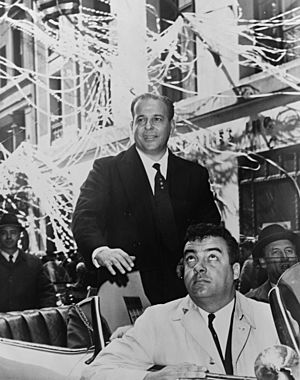
Basic Reforms Plan
Goulart's "Basic Reforms" plan (Reformas de Base) was a set of social and economic changes. These changes aimed for more government involvement in the economy. Key reforms included:
- Education Reform: To fight adult illiteracy using the methods of Paulo Freire. It also proposed university reform and wanted to direct 15% of Brazil's income to education.
- Tax Reform: To control how much money multinational companies sent out of the country. It aimed to reinvest profits in Brazil. Income tax would be based on personal profit.
- Electoral Reform: To allow illiterate people and low-ranking military officers to vote.
- Land Reform: To take large, unused properties (over 600 hectares) and give them to people. At that time, more Brazilians lived in rural areas than in cities.
Cuba and U.S. Relations
During the Cuban Missile Crisis in 1962, U.S. President John F. Kennedy asked Goulart if Brazil would join a possible invasion of Cuba. Goulart refused. He said Brazil would never use war to solve conflicts between nations. He also sent a letter to Fidel Castro with his concerns but stood against any invasion.
Because of this, Kennedy became wary of Goulart. He started to believe Goulart was a threat to U.S. security.
The Military Coup
In the early hours of March 31, 1964, General Olímpio Mourão Filho ordered his troops to move towards Rio de Janeiro. Their goal was to remove Goulart from power.
On April 1, Goulart left Rio for Brasília. He hoped to stop the coup politically. But in Brasília, he realized he had no political support. The Senate president, Auro de Moura Andrade, was already calling for Congress to support the coup. Goulart quickly gathered his wife and children and flew to Porto Alegre. Soon after his plane left, Auro de Moura Andrade declared the presidency "vacant."
In the early hours of April 2, Auro de Moura Andrade and the Supreme Federal Court president swore in Pascoal Ranieri Mazzilli as interim president. This was seen by many as unconstitutional because Goulart was still in Brazil.
In Porto Alegre, Goulart met with Leonel Brizola. Brizola suggested armed resistance. However, General Floriano Machado told Goulart that loyal troops were moving to Porto Alegre. He advised Goulart to leave the country to avoid arrest. At 11:45 AM, Goulart flew to his farm near the Uruguay border. He stayed there until April 4, when he finally flew to Montevideo.
The coup led to a military government that suspended many civil rights and freedoms. They abolished all political parties except two: the military's party and a controlled opposition party. Many politicians, students, writers, and artists were exiled or disappeared.
The U.S. government was not happy with President Goulart. He had an independent foreign policy, made friends with socialist countries, and opposed actions against Cuba. His government also limited how much profit multinational companies could send out of Brazil. The U.S. Ambassador to Brazil, Lincoln Gordon, played a role in supporting the opposition against Goulart. Documents later showed that the U.S. government was prepared to intervene militarily.
Life in Exile
On April 4, 1964, Goulart and his family landed in Uruguay to seek political asylum. After living in Montevideo for a few years, he bought a farm on the Uruguay-Brazil border. There, he focused on cattle farming.
In 1966, he joined a political movement called Frente Ampla (Broad Front) in Uruguay. This group aimed to bring back democracy to Brazil peacefully. After this movement ended, Goulart focused on managing his farms in Uruguay, Paraguay, Argentina, and Brazil.
In late 1973, the Argentine president invited Goulart to live in Buenos Aires. Goulart decided to stay there.
In March 1976, a group planning to kidnap Goulart's son was stopped by the Argentine Army. Feeling unsafe, Goulart moved away from Buenos Aires. He started planning his safe return to Brazil, but this was delayed due to upcoming elections.
Death and Investigations
On December 6, 1976, João Goulart died in his apartment in Mercedes, Corrientes, Argentina. The official cause was a heart attack. However, his body was not examined by doctors (no autopsy). So, the exact cause of his death is not confirmed. About 30,000 people attended his funeral. The military government censored news coverage of it.
Years later, in 2000, Leonel Brizola claimed that Goulart and another former president were killed as part of Operation Condor. This was a secret plan by South American military governments to remove political opponents. Brizola asked for investigations into their deaths.
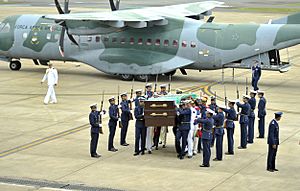
In 2008, a former intelligence agent from Uruguay said that Goulart was poisoned. He claimed the order came from a Brazilian intelligence chief. In July 2008, a commission in Rio Grande do Sul concluded that there was "strong evidence that Jango was willfully assassinated."
In 2009, a magazine published secret documents from Brazil's National Intelligence Service. These documents showed that an undercover agent was present at Goulart's properties in Uruguay. This supported the theory that he might have been poisoned. Goulart's family found documents from the Uruguayan government showing that his family was being watched.
In 2013, Goulart's remains were exhumed (dug up) for an official investigation into his death.
Political Beliefs
Helping Afro-Brazilians
João Goulart was known for being close to poor people, especially poor Afro-Brazilians. As a young man, he was one of the few white boys in his town to be part of a Carnival group that included many Black members. He even broke social rules by leading this group into a fancy club that usually did not allow Black people.
Views on Communism
Like many politicians during the Cold War, Goulart was sometimes accused of being a communist. He argued that many politicians, even conservative ones, received support from the Brazilian Communist Party. He said that simply accepting their support did not make someone a communist. Later, even his main accuser, Carlos Lacerda, admitted that Goulart was not a communist.
Tributes and Recognition
In 1984, a documentary film called Jango was released. It told the story of Goulart's political life. The film was very popular and won several awards.
Many schools across Brazil are named after João Goulart. Most are in his home state of Rio Grande do Sul. There are also schools named after him in Rio de Janeiro and Santa Catarina.
On December 6, 2007, a statue of Goulart sitting on a bench with his two children was put up in Balneário Camboriú.
On November 15, 2008, Goulart and his widow, Maria Teresa, received political amnesty from the Brazilian government. This officially recognized that they were wrongly treated. Maria Teresa also received financial compensation for the hardships her family faced.
Electoral Performance
| Year | Election | Position | Party | Votes | Result |
|---|---|---|---|---|---|
| 1947 | Rio Grande do Sul State Elections | State deputy | PTB | 4.150 | Elected |
| 1950 | Rio Grande do Sul State Elections | Federal deputy | PTB | 39.832 | Elected |
| 1954 | Rio Grande do Sul State Elections | Senator | PTB | 346.198 | Lost |
| 1955 | Brazilian presidential election | Vice-President | PTB | 3.591.409 | Elected |
| 1960 | Brazilian presidential election | Vice-President | PTB | 4.547.010 | Elected |
Images for kids
-
Vice President Goulart (right) at the inauguration of Juscelino Kubitschek on January 31, 1956.
-
Maria Thereza, Jango, Pat Nixon, Richard Nixon and João Carlos Muniz, in 1956.
-
Goulart with U.S. President John F. Kennedy during a visit to the United States in April 1962.
-
Goulart during a ticker tape parade in New York City, 1962.
-
Goulart's remains arrive in Brasília for exhumation, almost 40 years after his death, November 14, 2013.
See also
 In Spanish: João Goulart para niños
In Spanish: João Goulart para niños
- History of Brazil (1964–1985)
- Goulart family lawsuit against the USA
- João Goulart's House
 | Victor J. Glover |
 | Yvonne Cagle |
 | Jeanette Epps |
 | Bernard A. Harris Jr. |


